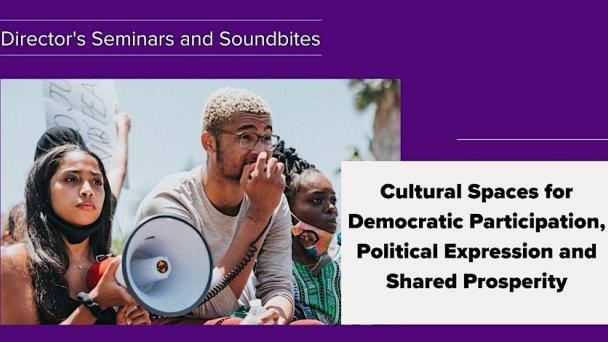Trust in trouble: how deliberative approaches can help us do democracy differently

On 27 July 2022, NatCen and The Policy Institute at King’s College London held the second in an ongoing seminar series looking at a range of aspects to do with both the theory and practice of public deliberation.
These seminars are designed to provide an informal, non-judgemental and conversational space for practitioners, theorists, policymakers and other interested parties to come together to listen to experts in their field talk about their perspectives on and experiences of deliberation, as well as their reflections on what works. The seminar was recorded and can be watched online.
This time we welcomed three fantastic speakers: Graham Smith, Professor of Politics at the University of Westminster. Graham is founding chair of the Knowledge Network on Climate Assemblies (KNOCA), funded by the European Climate Foundation, and is author of Democratic Innovations: Designing Institutions for Citizen Participation. Graham was joined by Dr Rod Dacombe, Senior Lecturer in the Department of Political Economy at King’s College London. Rod’s expertise lies in democratic theory and his book, Rethinking Civic Participation in Theory and Practice was published in 2018. Michelle Mackie, Research Director at Ipsos UK and Head of their Qualitative Research and Engagement Centre also shared her expertise, having designed deliberative exercises on topics as diverse as genome editing, the future of transport and NHS reform.
Between them our invited speakers covered a range of inspiring examples of how deliberation has gone on to shape policy and create impact.
Rod, who has just completed a review of the impact of all the projects listed on Participedia (such a fab resource), invited us to think expansively about impact, both in direct and indirect terms. It’s not always possible to trace a line from deliberation through to policy change (direct) but that doesn’t mean that the exercise has been without value. Rod spoke instead about the impact on participants (indirect), highlighting that these approaches manage to get those who are typically excluded, or feel left out of, political processes and systems – and that having their voice heard can be empowering, and transformational.
On to the examples themselves: whilst not the only fora for deliberation, citizens’ assemblies have been in public view for some time, and the Irish citizen assembly on abortion was held up as an example really thought to ‘capture the imagination’ of the public. It of course led to the referendum that codified a change in the law; now there is some impact! Michelle focused on her work on One London, in which 100 Londoners came together to deliberate some of the complex issues as to how we – as a London health and care system – should be joining-up and using people’s data to support individual care, to plan public services, and to enable research.
Regardless of the examples all three gave – whether international, national or local – Graham identified three key drivers for impact: getting the question right; setting the mandate and being sure to follow up on this; and, having an effective communications strategy to socialise the recommendations that could also help build a movement for change.
These points were endorsed by Michelle who also emphasised the need to secure involvement from the decision makers in the commissioning body, taking care to involve them at every step of the way. She cautioned that doing this well is not easy. There’s the time commitment of course – and the need, in many cases, to inform and educate commissioners about the process and what it will take. But above and beyond that it also requires openness; for commissioners to be willing to ‘put jeopardy on the table’ and respond meaningfully to participants’ recommendations.
This theme was further developed by Graham who referenced how these approaches have the power to effect culture change within commissioning organisations. In particular, the opportunity that deliberation affords for commissioners to see for themselves how citizens can grapple with complexity, and discuss sensitive and demanding issues in detail – and do it well – is a culturally powerful moment which ‘shifts prejudices about what is possible’. Of note here is a paper by Jane Suiter and colleagues, identifying that the discussion quality with participants in the Irish citizens’ assembly reached higher epistemic standards than analogous debates conducted in Parliament.
This sentiment was echoed by Michelle who referenced how commissioners’ presence in deliberative settings enables them to hear people’s concerns directly, articulated in an authentic way. She described how commissioners can be ‘removed from the people that they serve’ and that deliberation is one way that this gap can be closed.
Regardless of how impact is conceptualised though, the panellists all spoke about the barriers that stand in the way of realising it. Cost – which was also of interest to our audience through their questions – was of course one such barrier. There’s no shying away from the fact these processes are time intensive and are, financially, out of reach for many. What’s more, to do them well requires additional funding to help effect culture change within organisations, which Graham noted that we typically do not build into our work.
Those attending also raised a series of excellent questions, including whether deliberative methods could/should be mobilised by opposition parties, rather than just government. Panellists thought this an interesting proposition but also one that wouldn’t be easy – or even desirable – because it would bring into question the standard of ‘impartiality’ which deliberative design and evidence require (the side note here of course is that we normatively assume that state actors and institutions are de facto independent enterprises to be commissioning work of this type).
Attendees also wondered what work there had been on the impact on participants, and the role deliberations might play in building social cohesion. Whilst some work exists on this – e.g. Newton & Geissel’s useful (2012) book, Evaluating Democratic Innovations: Curing the Democratic Malaise?, and we’d refer to the treasure trove that is Participedia too – it is not always routinely measured or captured, with policy impact being the outcome and impact people tend to focus on. Given Rod’s earlier call to think expansively about impact, perhaps this is something that should become more commonplace.
A good question we ran out of time for was to consider what lessons there might be from the last time these methods rose and fell in fashion – with the focus on citizens’ juries in the ’90s. This of course is a point for all of us; to not forget the lessons of the past as we pursue what might be new for us. Perhaps a possible response would have been found in the note of caution sounded by our panellists: that it is crucial for practitioners and commissioners to have the right motives for using deliberative approaches, and to go about it in the right way. To illustrate this point Graham referenced the vast number of assemblies that have taken place with regards to the climate crisis. On the one hand, this could be seen as a success – a sign that these approaches are becoming normalised. But he challenged this, stating that just because something is repeated, it doesn’t mean that it is becoming embedded.
Further, there were questions as to whether the plethora of climate assemblies was just a sign that it has become ‘the thing to do’. Commissioners know there is a crisis – indeed, many local authorities declared climate emergencies – and convening an assembly is now the next step to take to determine how best to respond. But nuance matters. A citizens’ assembly isn’t always the right answer and the risk here is that if we think it is then we undermine the whole approach.
With that there was, once again, a call for more collaboration and sharing. Graham spoke about the work being done by KNOCA, which provides a forum for people to share their thoughts and lessons not only on design, but also on commissioning. This is exactly the kind of constructive space we hope to provide at these seminars. We want people to ask what they might think of as stupid or difficult questions – we welcome them all. Because it’s only by learning from each other – our failures as well as our successes – that we will be able to make progress. We look forward to seeing you next time!




Receive a regular update, sent directly to your inbox, with a summary of our current events, research, blogs and comment.
Subscribe